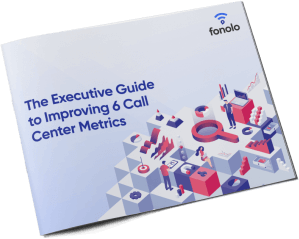Have you ever asked yourself how your leadership style affects your call center operations? You should! Things are busy for contact center leaders and there’s not much time for reflection. But your management style deserves your attention. It affects how you interact with and lead your team members. Your call center leadership style can also impact how you set and meet strategic goals, and ultimately, what your customer’s experience will be like.
Why Does Leadership Style Matter?
Keyword: awareness. The first step towards success in any task is knowing the playing field. For contact center managers, that means you should understand:
- Historical data
- Team member expertise and capabilities
- Industry trends
- Latest tech
- Leadership styles
Experts say that understanding yourself makes you more effective, especially in leadership. Why? You have the awareness to notice your strengths and weaknesses, and identify where you can improve call center operations.
For example, knowing you’re a hands-off leader may help you identify areas where you should pay closer attention, say with remote agents’ training. On the other hand, knowing you’re an employee-centric leader might prompt you to critically analyze decisions that could require more executive input. Once you know your management style, you can better respond to the ups and downs of a call center.
Contact Center Leadership Styles
Let’s take a closer look at five call center leadership styles. Our advice? Don’t pigeonhole yourself into just one. Even if you lean toward one style, consider the pros and cons that come with different approaches. Try to learn from the leadership styles you’re less familiar with!
1. Hands-Off
It’s not unusual for call center agents to complain about being micromanaged. When managers analyze every second of an agent’s day, it hinders productivity. Here, the hands-off (laissez-faire) leadership style comes in handy.
FACT:
Micromanagement lowers morale, reduces productivity, and increases employee turnover.
A hands-off leader trusts team members and agents to do their jobs with little supervision or intervention. Offering agents more autonomy is a fabulous way to improve agent engagement—but it’s not the right approach for every situation. What happens if you have a number of inexperienced, remote agents? You can’t expect new hires to meet customer experience expectations from home without support.
Pros:
- Improves agent engagement
- Encourages innovation
- Leverages helpful technology, like Scheduled Call-Backs
Cons:
- Problematic for teams with less experience
2. Influential
You’re a visionary leader with big plans for your contact center. After years of the same customer complaints or consistent operational inefficiencies, you’re ready to change the status quo. Influential, or transformational, call center managers are enthusiastic, charismatic and extremely motivational. They wake up the energy and passion in their teams to spark much-needed change.
The only downside? Some call center managers are all talk. Let’s say you have a dream to address constant customer complaints about agent indifference. You discuss a grand plan to train your agents in empathy and measure progress by analyzing Csat scores. But…
You keep pushing back the training.
You don’t share progress with your staff.
Your big plans have no substance.
TIP:
Influential leaders are inspiring! But if you don’t follow-through and achieve results, your agents may lose respect for you. Plan properly and take the steps needed to meet your goals!
Pros:
- Builds trust with employees
- Addresses and sparks change for systemic issues within the call center
Cons:
- Can backfire without sufficient planning and results
3. Employee-Centric
Democratic, participation style, and feedback-oriented are all synonyms for the employee-centric leadership style. You value your team members’ opinions, insights, and feedback—so much that you use it to make strategic and operational decisions. Talk about empowerment! Your agents will thrive knowing their input matters, and you’ll likely notice happier customers, too!
The only problem? Some decisions need to be made by leaders, not employees. That’s why you’re here! Our advice? Consider employee feedback but remember you have the final say for contact center operations.
Pros:
- Makes agents feel valued
- Instills a culture of fairness
Cons:
- Might overlook the need for executive input
4. Absolute
Nobody likes a dictator, but there are times when authoritative leadership is needed in a call center. Sometimes your agents don’t see the vision you might have for crushing quarterly goals and surpassing customer expectations. Sometimes managers need to make decisions primarily on their own.
This works a fraction of the time. You’ll create a toxic work environment If you don’t trust your agents to offer input on decisions that affect them.
Pros:
- Effective for meeting tight deadlines
- Overcomes agent inexperience
Cons:
- Creates a toxic work environment
- Leads to agent attrition
5. Transactional
A transactional leader responds to positive performance with rewards and negative performance with punishment. While incentives are a common motivator, negative reinforcement might diminish employee morale. Transactional leaders are results-driven and see the agent-manager relationship as a logical exchange.
- Poor performance = negative reinforcement like discipline or even termination
- Strong performance = rewards like preference scheduling and raises
Bottom line? If you’re going to reward employees for strong performance, make it count.
TIP:
Scheduling preferences and extra vacation days are nice perks, but agents find bonuses, promotions and raises more appealing.
Pros:
- Works well if rewards are meaningful (raises and advancement)
Cons:
- Slightly patronizing to employees if rewards aren’t monetary
- Not linked to long-term performance
5 Tips for Being an Effective Call Center Leader
Whatever your style may be, these tips will help you succeed as a call center leader:
- Be adaptable: Don’t accept one leadership style as the be-all-end-all. The best approach is to adapt to the demands of the situation, sometimes pivoting from one style to another.
- Be patient: You might not find a leadership style groove right away. It’s OK to experiment with different techniques and gather data from analytics or employee feedback. Try brainstorming with other call center managers, too!
- Channel empathy: This goes for both customers and call center agents. Working in a high-turnover industry means a little compassion goes a long way.
- Admit when you’re wrong: Sometimes you don’t have the right solution. It’s best to be honest and it’s OK to show vulnerability occasionally. Your colleagues and agents respect you more for your candor.
- Adopt a tech-forward mindset: Your competitors are investing in the best SaaS tech to meet their employee and customer needs. Reduce the burden on agents by trying out a software solution like Fonolo’s Voice Call-Backs — you’ll give customers autonomy and smooth out call spikes as well!

The Executive Guide to Improving 6 Call Center Metrics
Measuring and improving call center metrics can be a pain point for executives. Download our free guide to help you improve 6 key call center metrics.
